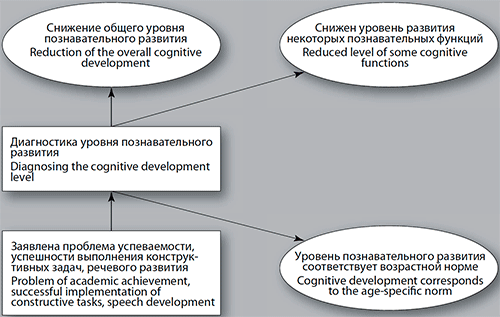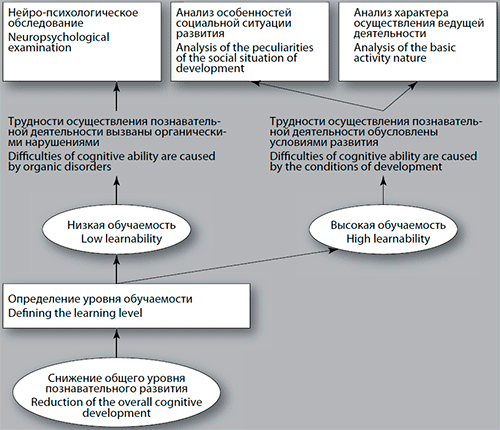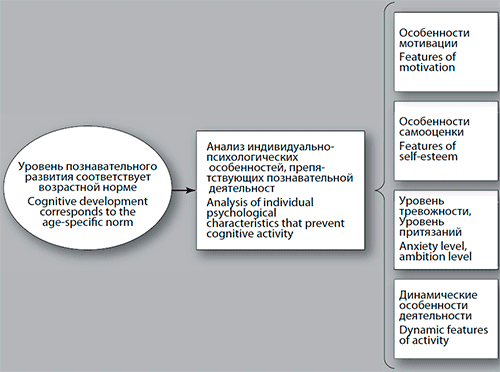Article
Zakharova E.I. (2017). Principles of managed intellectual activity in training psychologists. National Psychological Journal. 3, 151-157.
Abstract
The paper considers the possibility of using the principles of gradual development of intellectual activity in the training experts of developmental psychology. The issue of the managed development of professional work components is being raised. A possible way of working is discussed analysing the features of child actual development aimed at discovering the reasons for the learning difficulties, which served as an excuse for the parents to seek psychological assistance. The method of analysis becomes an important competence of a consulting psychologist against the background of a high variety of forms of mental development. Development of readymade algorithms for solving a problem situation, covering all their diversity seems next to impossible. In this regard, there is a need to prepare students for an independent analysis of a specific life situation. It is the ability to this kind of analysis that ensures the expert’s preparedness to develop recommendations that contribute to harmonizing the child’s development.
Elaboration of this competence implies the integration of knowledge and skills acquired in various training courses. This possibility is provided by shaping the student’s orientation in the learned action taking into account its level structure. Semantically speaking, orientation allows one to recover the logic of the child’s examination and child development according to the goal set. The orientation is based on the mechanisms and conditions of mental development. The choice of adequate diagnostic tools becomes an independent task of the analysis that requires understanding of the available techniques and diagnostic tools. Summing up, the operational level of orientation provides competent use of the means chosen during diagnostic examination. Taking into account the orientation level of the developed activity makes it possible to integrate the knowledge and skills gained in the process of training into psychologist expert practice.
Accepted: 07/23/2017
Pages: 151-157
DOI: 10.11621/npj.2017.0317
PDF: Download
Keywords: managed development; psychological examination; semantic orientation; development conditions; psychological counseling;
Available Online 10.10.2017

Fig. 1. Analysis of the child actual development using orientation

Fig. 2. Analysis of the child intellectual development decrease

Fig. 3. Analysis of cognitive difficulty within cognitive development corresponding to the age-specific norm
References:
Allen, J.L., Abbott, M.J., Rapee, R.M., & Coltheart, M. (2006) Recognition of expressions of disgust by children with obsessivecompulsive disorder. Behaviour Change, 23, 239–249. doi: 10.1375/bech.23.4.239
Arievich, I.M., Orestov, R.O., & Podolsky, A.I. (1990) Experience in applying the principles of gradual development of intellectual activity in the training of experts. [Psikhologicheskiy zhurnal], 11, 4.
Astapov, V.M. (2008) Anxiety in children. Kognito Tsenter, Moscow, 240.
Bekhoeva, A.A. (2017) Designing a program for developing career and teacher-training reflection of future teachers based on a reflexive activity approach. National psychological journal, 1 (25), 56–63. doi: 10.11621/npj.2017.0107
Burmenskaya, G.V. (2003) Psychological examination of preschool and primary school children: texts and methodological materials. Moscow, UMK «Psikhologiya», 349.
Burmenskaya, G.V., Zakharova, E.I., Karabanova, O.A. et al. (2002) Age-specific approach in counseling children and adolescents: manual for higher school. Moscow, Izdatel’skiy tsentr «Akademiya», 416.
(1994) Diagnostic and Statistical Manual Disorders. Washington.
Galperin, P.Ya. (2002) Lectures on psychology. Moscow.
Kapustin, S.A. (2015) Balanced style of parental upbringing and its influence on the child personality development. National psychological journal, 4 (20), 119–129. doi: 10.11621/npj.2015.0412
Karabanova, O.A., Podolsky, A.I., & Podolskaya, T.A. (1989) Psychological training of the teaching personnel in the energy sector training departments. Moscow, VIPKenergo, 69.
Baldry, A.C., & Farrington, D. P. (2000) Bullies and delinquents: Personal characteristics and parental styles. Journal of Community & Applied Social Psychology, 10(1), 17–31. doi: 10.1002/(SICI)1099-1298(200001/02)10:1<17::AID-CASP526>3.0.CO;2-M
Banerjee, R., & Henderson, L. (2001) Socialcognitive factors in childhood social anxiety: a preliminary investigation. Social Development, 10, 558–572. doi: 10.1111/1467-9507.00180
Blocher, D. H. (1966) Developmental Counseling. N. Y., Ronald Press.
Corey, G. (1972) Theory and Practice of Counseling and Psychotherapy. Monterey, Calif., Brooks/Cole.
Deonna, T., & Roulet-Peres, E. (2005) Cognitive and behavioural disorders of epileptic origin in children. London:Cambrige University Press, 81–96.
Easter, J.B.S., McClure, E.B., Monk, C.S., Dhanani, M., & Hodgdon, H., et al. (2005) Emotion recognition deficit in pediatric anxiety disorder: implication for amygdala research. Journal of child and adolescent psychopharmacology, 15, 563–570. doi: 10.1089/cap.2005.15.563
Egan, G. (1986) The Skilled Helper: A Model for Systematic Helping and Interpersonal Relating, 3rd Ed. Monterey, Calif., Brooks/Cole.
Grawe, K. (2006) Agents of Change in the Processes of Psychotherapy, Part I. In: IFP Newsletter. Zurich, June, 7–17.
Khoziev, V.B., Khozieva, M.V., & Dzetovetskaya, S.V. (2008) Psychological counseling of parents: textbook. Moscow, Moskovskiy psikhologo-sotsial’nyy institut; Voronezh: MODEK, 501.
Lebedinsky, V.V. (2003) Violations of mental development in childhood: manual for higher school. Moscow, Izdatel’skiy tsentr «Akademiya», 144.
Lyaudis, V.Ya., Ilyasov, I.I., Mal’skaya, O.E., & Mozharovsky, I.L. (Eds.) (1989) Constructing student studying activities. Moscow, Izdatel’stvo MGU, 240.
Nechaev, N.N. (1988) Psychological and teacher-training bases of professional activity. Moscow, MGU, 165.
Podolsky, A.I. (1985) The gradual development of intellectual activity in vocational training. [Voprosy psikhologii], 5, 29–36.
Podolsky, A.I. (2012) Psychological concept P.Ya. Galperin: some trends and prospects for further development. [Vestnik Moskovskogo universiteta]. Series 14. Psychology, 11–23.
Podolsky, A.I., & Idobaeva, O.A. (2016) The connection of the adolescent value orientations with the psychological characteristics of teachers and parents. National psychological journal, 2 (22), 84–93. doi: 10.11621/npj.2016.0208
Pogozhina, I.N. (2015) Determination of cognitive structures development: post-nonclassical theoretical model. National psychological journal, 3 (19), 35–44. doi: 10.11621/npj.2015.0304
Rean, A.A., Baranov, A.A., & Makhmutova, R.K. (2016) Optimizing intrafamily emotional interaction of the mother and a pre-school child with intellectual disability. National psychological journal, 4 (24), 108–114. doi: 10.11621/npj.2016.0413
Reshetova, Z.A. (1985) Psychological foundations of vocational training. Moscow.
Talyzina, N.F. (1984) Managing knowledge mastering: psychological foundations. 2 nd ed., Additional, corrected. Moscow, MGU, 344.
Zinchenko, Yu. P., & Karabanova, O.A. (2012) On the way to the expert career of Russian psychologists: summing-up of the 5th congress of the RPS. [Voprosy psikhologii], 3, 158–160.
For citing this article:
Zakharova E.I. (2017). Principles of managed intellectual activity in training psychologists. National Psychological Journal. 3, 151-157.


